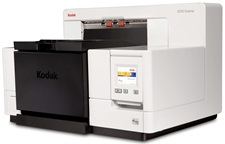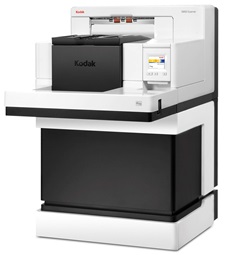Meet Federal FADGI Requirements with Kodak Alaris
Learn why FADGI-compliant scanners are required for organizations that submit records to NARA and the Library of Congress.
The Federal Agency Digital Guidelines Initiative (FADGI) is a government effort to move away from paper records toward fully digital record keeping. The guidelines establish methods, practices, and quality standards to digitally organize all historical, archival, and cultural content within the National Archives and Records Administration (NARA), and the Office of Management and Budget (OMB), for starters.
NARA and the OMB announced they are no longer accepting paper documents as of July 1, 2024. All materials sent to either NARA or the Library of Congress must now meet FADGI guidelines.
Many organizations are now faced with the challenge of complying with FADGI standards, and this mandate is likely to extend to all federal agencies and the organizations that submit digital records to them. Kodak Alaris serves many federal government agencies and is helping many organizations to update their digital workflows and systems for FADGI compliance.
See our FADGI solution bundles
FADGI Ratings
FADGI guidelines were updated in 2023 to make it easier for organizations to understand and produce FADGI-compliant records for permanent archiving. FADGI now outlines two categories, Modern Textual Records (MTR), and a separate set of guidelines for heritage and cultural media. The vast majority of FADGI submissions (about 95%) fall into the MTR category because the MTR guidelines are optimized for modern text-based documents.
MTR compliance covers printed documents including typed or laser-printed documents, books and journals, photographic prints, and other text documents created on modern office paper, with moderate to high contrast between the text and the paper background. MTR also includes support for grayscale records.
Heritage documents such as important antique records will use a four-star rating system that measures image quality as follows:
-
One star: Meets minimal FADGI requirements but may have limitations or deficiencies in quality or accuracy. This is suitable for basic digitization tasks but not ideal for high-quality reproduction projects or OCR projects.
-
Two star: Provides satisfactory FADGI compliance suitable for digitization projects but may not meet OCR standards.
-
Three Star: High-quality images that meet the most recommended requirements for color accuracy and preservation standards. It is ideal for demanding digitization projects and well-suited for OCR. The Modern Textual Records (MTR) standard is similar to this Three-Star rating but with reduced sampling frequency and tone response requirements.
-
Four Star: Images suitable for almost any use from high-level image capture at 400 ppi.
As of July, 2024, all organizations interacting with the Library of Congress and the National Archives administration must submit digital records that meet FADGI guidelines for their respective media types. These digital standards will likely extend to all federal agencies over time, so it’s critical that organizations that interact with US government agencies are prepared to meet these requirements.
FADGI Best Practices: Diving into the Details
For organizations submitting to agencies such as the Library of Congress and National Archives, FADGI also outlines the following best practices for still image capture:
-
Do not apply pressure with a glass platen or use vacuum boards, high UV light sources, or automatic page turning devices unless approved by a paper conservator.
-
For master files, the image, document, or photograph must include the entire area of the page with a small white border.
-
For oversized material that has sections compiled into a single image, the separate images must be saved for archival purposes.
-
For transparencies, tonal scale and color balance should match the original transparency.
-
When scanning negatives, tonal orientation should be inverted to a positive.
-
Master files should not be retouched.
Digital Imaging Conformance Evaluation (DICE)
DICE provides detailed information on the performance characteristics of scanned images. These targets are meant to measure and monitor a document's output image values to determine FADGI compliance. DICE testing and a monitoring system provide the foundation for a digitization program compliant with FADGI. Analysis software and DICE targets are necessary for FADGI conformance.
Kodak Alaris Makes FADGI Compliance Simple
 FADGI requirements are a bit complicated, but Kodak Alaris makes it easy for any organization to produce FADGI-compliant digital files. The KODAK i5250 and i5850 Scanners are compliant out of the box and provide a simple FADGI mode toggle that’s unique to the entire scanner market. This toggle makes it easy for organizations to produce FADGI-compliant output when necessary and turn it off for normal document scanning.
FADGI requirements are a bit complicated, but Kodak Alaris makes it easy for any organization to produce FADGI-compliant digital files. The KODAK i5250 and i5850 Scanners are compliant out of the box and provide a simple FADGI mode toggle that’s unique to the entire scanner market. This toggle makes it easy for organizations to produce FADGI-compliant output when necessary and turn it off for normal document scanning.
Our scanners are known in the industry to produce the best image possible, and we work diligently to ensure that our customers are producing electronic records that meet and exceed FADGI requirements.
If your organization has purchased scanners from Kodak Alaris in the past, there are no system updates that can retrofit your scanners into FADGI-compliant status. However, acquiring our new scanners will offer many additional benefits beyond FADGI compliance.
Not all records need to be compliant with FADGI guidelines, but if your organization ever needs to send records to NARA or the Library of Congress, you’ll need to incorporate FADGI compliance into your operations immediately.
For more information about how Kodak Alaris can help you obtain and deploy FADGI-compliant scanners, check out alarisworld.com/go/FADGI.
Insights and Case Studies
This Technology Is a Game-changer for Election Ballot Processing
The mail-in ballot processing solution that county election officials have been asking for
Government Mandates Transform Electronic Data Management
Read this informative guide on electronic document management for government agencies and learn more about NARA and the executive order M-19-21.
Related solutions

i5250 Scanner
150ppm | 750 Sheet ADF- Rugged and dependable scanning
- Surepath™ intelligent document feed technology
- Unlimited duty cycle
- Optional pre & post imprinting

i5850 Scanner
210ppm | 750 Sheet ADF- Floor standing and height adjustable
- Surepath™ intelligent document feed technology
- Unlimited duty cycle
- Intelligent document tracking & imprinting
ABOUT THE ALARIS DIVISION OF KODAK ALARIS
Kodak Alaris is a leading provider of information capture and intelligent document processing solutions that simplify business processes. We exist to help the world make sense of information with smart, connected solutions powered by decades of image science innovation. Our award-winning software, scanners, and professional services are available worldwide and through our network of channel partners.
Partners
Privacy Notice | Legal / Site Terms | California Notice at Collection | Do Not Share My Personal Information
© 2024 Kodak Alaris Inc. TM/MC/MR: Alaris, ScanMate. All trademarks and trade names used are property of their respective holders. The Kodak trademark and trade dress are used under license from Eastman Kodak Company.

